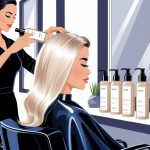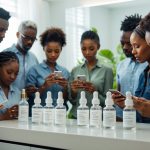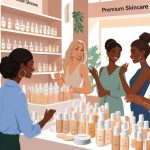Skin Barrier Myths Finally Addressed by Dermatologists for Concerned Adults
Lifestyle and Environmental Strategies for Skin Protection
Why do water intake, humidity, and lunch seem to decide if I’ll wake up glowing or looking like I lost a fight with a cactus? Dermatologists say skin barrier health is a million tiny things, not one expensive serum or moisturizer.
Impact of Diet and Hydration
Nobody ever told me sweet potato fries might help my skin. Beta-carotene, sure, but fiber too? Yale had a study in 2024, but who knows—next week it’ll be kale again. If I skip water for a day, my cheeks don’t shrivel, but they look dull. Dr. Ranella Hirsch admitted, “Even mild dehydration makes skin appear dull or flaky.” Electrolytes matter—sodium, potassium, magnesium—so yeah, coconut water is fine, but not a miracle. Sometimes I wonder if coffee is the enemy, but giving it up makes life unbearable, so forget that. Antioxidant foods get hyped everywhere—spinach, blueberries, red peppers, whatever. Nobody warns you about chia seeds in your teeth.
Coping with Seasonal Changes and Dry Air
Winter hits, and suddenly my face feels like sandpaper. I bought a hygrometer just to prove the dry air wasn’t imaginary. Anything under 40% humidity, and my hands crack by lunch. Central heating is a disaster, especially when I forget to refill the humidifier and wake up with lips like old receipts. My forehead? Oily and oblivious. My cheeks? Furious at the first sign of frost. Layering plain petrolatum over a light moisturizer at night keeps me from looking like I wandered the desert. Oh, and scented candles apparently dry the air faster, which nobody mentions. Figures.
Daily Habits to Support a Radiant Complexion
Double cleansing at night, micellar water first, then some creamy cleanser—sure, that’s the gospel for makeup lovers. But honestly, every dermatologist I halfway trust keeps warning me not to get carried away. “Barrier damage sneaks up on you with invisible inflammation,” Dr. Susan Taylor said last fall, and I keep replaying that in my head every time I lather up out of boredom. Exfoliation? Twice a week, tops. I mean, glycolic serums make me feel like I’m doing something fancy, but then my skin’s just mad at me. SPF30, broad spectrum, goes on in the morning (even if it’s cloudy—apparently 80% of UV still gets through, thanks Mayo Clinic for the anxiety), but remembering to reapply? Nope, I fail at that all the time. I toss a mineral sunscreen stick in my car, otherwise it just doesn’t happen. Sleep, yeah, I suck at that too. But if I ever manage seven hours, I actually look like a human in the mirror. There’s no magic routine, honestly—my skin just does what it wants, so I jot random reminders in my notes app and hope for the best.
Frequently Asked Questions
Can someone explain why in 2025, people still freak out about their skin barrier every time a product goes viral? One week it’s some “miracle” hack, next week it’s a month-long breakout. I’ve got derms on speed dial, a graveyard of half-used tubes, and somehow the myths just keep multiplying. Like, can we get a break?
What are the common misconceptions about skin care routines?
Why do people think more steps mean better skin? I’ve seen folks swear by scrubbing their faces raw or switching cleansers like it’s a magic trick. Dr. Gallo (TIME, 2024) straight up said that pandemic over-washing is still wrecking skin, but nope, people keep double cleansing even if they barely wear SPF or makeup. Old habits die hard, apparently.
And skipping moisturizer because your skin’s oily? Come on. Every dermatologist I’ve ever bugged says oil and water are not the same thing, and even the shiniest face still needs moisturizer. Yet people keep buying “pore-shrinking” toners—like pores are little trap doors or something. Show me the science. I’ll wait.
Can certain skin care products actually damage the skin barrier?
People act truly shocked when their “brightening acid” cocktail, plus nightly retinol, plus whatever essential oil, leaves them with a flaky, angry face. I get DMs about random irritation after someone tries a new multi-acid peel—because more must be better, right? Dr. Marianna Blyumin-Karasik (NewBeauty, 2024) keeps saying: too many actives at once will just torch your barrier.
Hand sanitizers? Still killing skin in gyms and offices everywhere. Great for germs, but give it a few weeks and you’ll have sandpaper hands. My friend’s hands were shredded after a hiking trip and a month of sanitizer. Don’t assume a fancy bottle saves you from overdoing it.
How can you really tell if your skin barrier is damaged?
Do you get weird rashes, burning after you wash your face, or shiny patches that sting in the wind? Because that’s what I get when I try three new products at once. Derms always say: if your skin suddenly hates everything, even stuff that used to be fine, you probably broke your barrier.
But then people DM me about “invisible” barrier damage or a random rough patch. Not every little thing is a crisis, but if your skin basically cries at sunscreen, yeah, maybe rethink your routine. And honestly, panicking over every tiny change? That’s its own myth. Usually it’s not that dramatic unless you went full product-junkie.
Which ingredients should you look for to effectively repair your skin barrier?
Why did “cica creams” and ceramide serums blow up just because some influencer said so? I learned the hard way: boring ceramides (think CeraVe, La Roche-Posay, Eucerin) and basic humectants like glycerin or hyaluronic acid actually work. Fatty acids and cholesterol too—yeah, it’s just skin science, nothing wild.
A Chicago derm (Dermatology Times, 2024) told me: patch test new “barrier balms” or risk a red, angry face. And please, skip the essential oils—just because it’s “natural” doesn’t mean your skin wants it. Lavender in everything? Allergies are real.
Is there a truth to the belief that natural skin care is always better?
Why does the “natural is better” thing come back every year? Like, Cleopatra used olive oil, so I should too? Sure, but she didn’t have city smog or 2025-level stress. I see people breaking out from random botanicals they can’t pronounce, just because TikTok said it was pure.
Derms hardly bother arguing: “natural” isn’t safer. Plenty of plants (poison ivy, anyone?) are brutal on your skin. And why do organic masks come in jars that turn into science experiments after a week? If someone can explain that, maybe I’ll try kale on my face again. But honestly, probably not.
Are there any skincare practices that are more harmful than beneficial?
Oh, absolutely. Slathering straight-up Vaseline all over your face in the middle of a humid July, then thinking, “Hey, let’s follow this up with a 12% lactic acid peel!”—I mean, what are we even doing? Sometimes I wonder if influencers are just competing to see who can invent the worst possible skincare routine. Over-exfoliating because you saw someone on TikTok promise “glass skin”? Good luck with that. Those walnut shell scrubs? I’ve literally seen more scars than smooth skin. Who’s still buying those?
One time someone—no joke—put toothpaste on a zit and ended up at the dermatologist for a cortisone shot. I’m still not sure if that’s urban legend or just regular Tuesday now. Advice from 2012 YouTube videos just refuses to die, doesn’t it? Not sure how we’re still stuck on that.
And, okay, three dermatologists I’ve worked with all say the same thing: SPF isn’t optional. But over-cleansing? Yeah, that’s a thing people do, and it’s not great. If you’re about to drop $60 on a “magnetic mask” or try micro-needling at home, maybe just… I don’t know, close the tab and go drink some water. Or stare at a wall. Anything but that.



